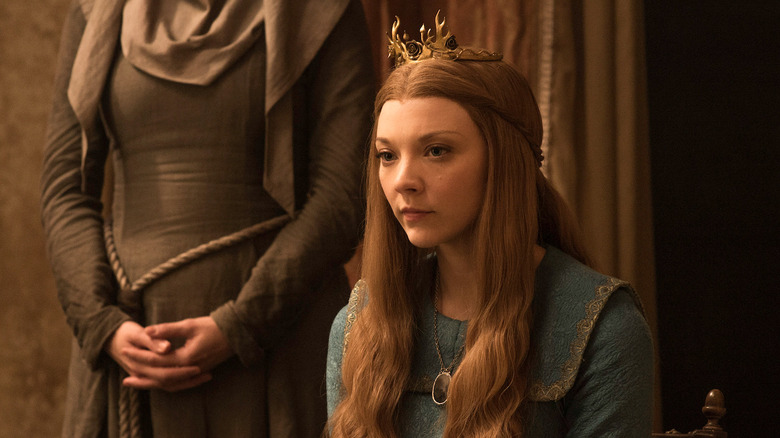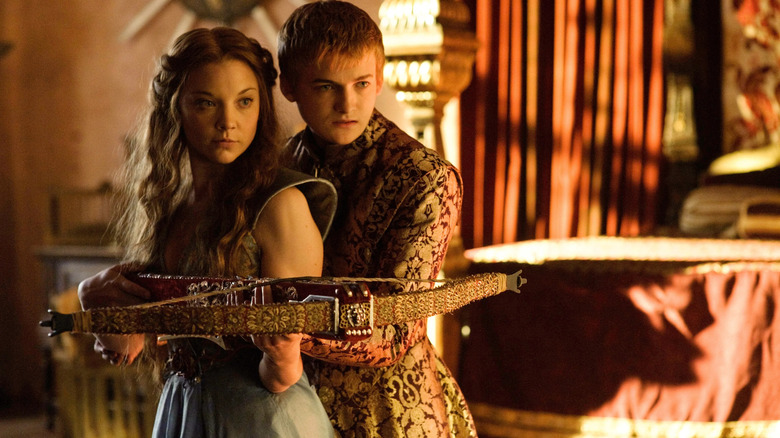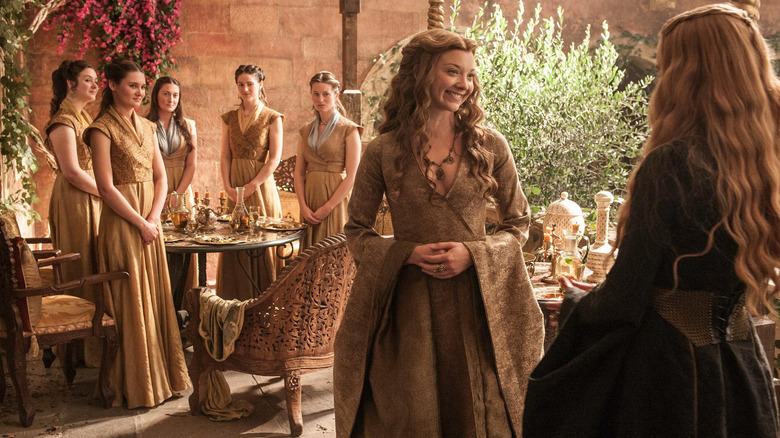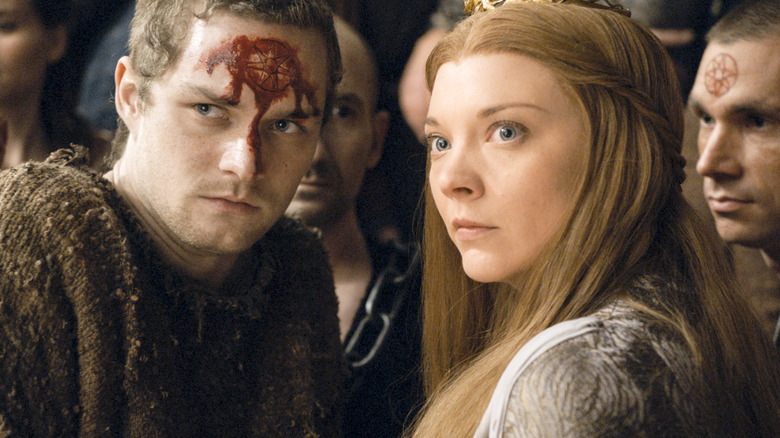Natalie Dormer Thinks Game Of Thrones Would Have Been Easier To Act In As A Villain
Say what you will about the legacy of "Game of Thrones," but one thing the series always understood was the power of a compelling antagonist. People don't agree on much, but hatred for Joffrey Baratheon is basically universal. The bastard king was loathed well before he chopped off Ned Stark's head because he'd already revealed himself to be a spoiled, cruel and pathetic prince. The more time we spent with him, the more our hatred grew. But villainous as he may have been, Joffrey was hardly the biggest threat to the show's protagonists. He knew basically nothing about waging war or ruling the kingdom, and wouldn't have lasted a mere millisecond on an actual battlefield. An untrained Arya Stark nearly killed him in the second episode! But there were plenty of other capable antagonists milling about.
Initially a mystery, Ramsay Bolton shared Joffrey's penchant for cruelty but had the brains to back it up. Meanwhile, Cersei's ambition knew no bounds and Tywin Lannister basically cut the cast in half by sending a few letters. Littlefinger sowed chaos at every opportunity and then, of course, there was the ever-approaching presence of the Night King (no need to rehash whether or not that paid off in the end). But the villains weren't the only ones making moves. "Thrones" famously touted quite a few characters who existed in a grey area and among them, my absolute favorite was Natalie Dormer's Margaery Tyrell.
A morally grey queen for a morally grey kingdom
Margaery had everything she needed to win the Iron Throne: the cunning, the right family name, the love of the people, and a royal engagement. In fact, she had three royal engagements, repeatedly queuing her up to be queen. Alas, every time it seemed like a long reign was ahead of her, it slipped between her fingers. But not even two dead husbands and religious imprisonment could hold Margaery back. She always found a way to manipulate someone new and weasel her way back into power.
In a 2016 interview for the HBO production diary, Natalie Dormer admitted that Margaery's savviness made her a difficult character to play. Asked about the most challenging aspect of her role, she answered "Trying to play a character so finely-nuanced that people believe you can be a good person who is also politically savvy." Dormer added: "It's easier to play a nihilistic person or a baddie; you have to get your hands dirty and have real talent, as Jack Gleeson [Joffrey Baratheon] proved, but it's a simpler task to play a straight psychopath."
Margaery's political acumen was her defining characteristic, along with her unwavering ambition. But while she easily could've been yet another power-hungry player willing to murder for the throne, she also projected compassion and empathy. "The thing I wanted to communicate with Margaery is that good people can, hopefully, be in positions of power," Dormer said. "I think that's quite pertinent. I've tried to make her a plausibly real, sensitive, good human being with the skills of a good leader."
Who was Margaery, really?
Was it genuine when Margaery endeared herself to the smallfolk by visiting orphanages and donating food or was it only about maintaining a good public image? In the same vein, did she take Sansa under her wing to protect a vulnerable teen or to make sure she was friends with the only non-rebelling Stark? For the most part, the true intentions of Margaery Tyrell were purposely cryptic. Everyone has their own take, including Natalie Dormer.
In the sixth season, after time spent wallowing in imprisonment a la the Faith Militant, Margaery returns to the Red Keep with a renewed sense of purpose and guilt for pretending to care about the smallfolk. She throws her weight behind the faith and the High Sparrow, convincing her husband — King Tommen — to do the same. But given literally everything Margaery has done in her life up to this point, this heel turn was a hard pill to swallow, leaving the audience to wonder: was it all an act, or did Margaery really have an epiphany?
All hail Margaery Tyrell, actress extraordinaire
The answer was a matter of interpretation ... at least until Margaery sent her grandmother away with a Tyrell rose sketched onto a napkin. That was our signal: she wasn't brainwashed, just playing things up for the High Sparrow. But for Natalie Dormer, it was never as clear-cut as 'is Margaery lying or telling the truth.' As far as she was concerned, both could be true:
"If any of us were forced to sit in a dark cell on our own, we would do some soul searching. But I've always held firm that Margaery's heart is true – I don't think she has a dark spirit. She's giving a narrative to Tommen that helps convert him at that moment. Maybe she was able to mix a bit of the truth in there – that's the most effective kind of lying isn't it?"
Dormer's perspective on Margaery's shift is a prime example of what made the character so compelling — despite her lofty ambitions of becoming the Queen of Westeros, she was never unequivocally a terrible or good person. How much of her public persona was just for the sake of winning people over? It was ultimately impossible to say. In the end, she was just a really good player in the game of thrones, going toe-to-toe with Cersei Lannister until her dying breath.



